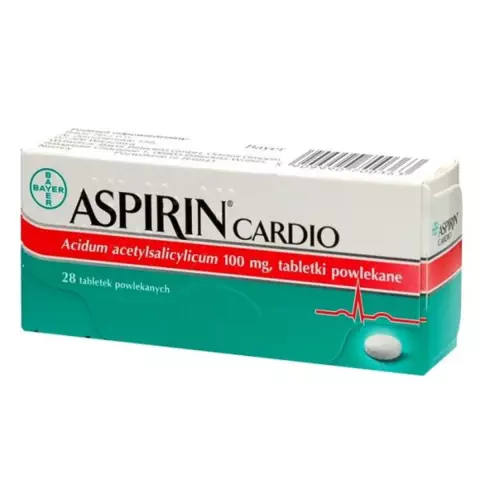- Author Rachel Wainwright wainwright@abchealthonline.com.
- Public 2023-12-15 07:39.
- Last modified 2025-11-02 20:14.
Aspirin Cardio
Instructions for use:
- 1. Release form and composition
- 2. Indications for use
- 3. Contraindications
- 4. Method of application and dosage
- 5. Side effects
- 6. Special instructions
- 7. Drug interactions
- 8. Terms and conditions of storage
Prices in online pharmacies:
from 75 rubles.
Buy

Aspirin Cardio is a non-steroidal anti-inflammatory drug (NSAID) with antiaggregatory, anti-inflammatory, analgesic, antipyretic effects.
Release form and composition
Dosage form - tablets, coated with a coating, soluble in the intestine: white, round biconvex, the core of the tablet is a white mass with a homogeneous structure (10 or 14 pcs. In a blister, in a cardboard box 2 or 4 blisters).
1 enteric-coated tablet contains:
- active substance: acetylsalicylic acid (ASA) - 100 mg or 300 mg;
- auxiliary components: corn starch, cellulose powder;
- shell composition: polysorbate 80, Eudragit L30D (copolymer of methacrylic acid and ethacrylate), sodium lauryl sulfate, triethyl citrate, talc.
Indications for use
- stable angina pectoris, unstable angina pectoris, including with suspected development of acute myocardial infarction;
- primary prevention of acute myocardial infarction (in the presence of such risk factors as hyperlipidemia, diabetes mellitus, arterial hypertension, old age, smoking, obesity), repeated myocardial infarction;
- prevention of transient disorders of cerebral circulation;
- stroke prevention, including in patients with transient cerebrovascular accident;
- prevention of deep vein thrombosis;
- prevention of thromboembolism after coronary arteries and arteriovenous bypass grafting, endarterectomy and angioplasty of the carotid arteries, angioplasty and stenting of coronary arteries, other invasive interventions or operations on the vessels;
- prevention of thromboembolism of the pulmonary artery, its branches, including the state of prolonged immobilization after major surgical operations.
Contraindications
- bronchial asthma, which occurs while taking salicylates and NSAIDs;
- aspirin triad (a combination of bronchial asthma, ASA intolerance and recurrent polyposis of the nose and paranasal sinuses);
- hemorrhagic diathesis;
- severe renal failure (creatinine clearance less than 30 ml / min);
- acute period of erosive and ulcerative lesions of the gastrointestinal tract (GIT), gastrointestinal bleeding;
- chronic heart failure (NYHA functional class III-IV);
- severe hepatic impairment (on the Child-Pugh scale - class B and higher);
- simultaneous use of methotrexate at a dose of 15 mg per week or more;
- the period of pregnancy (I and III trimesters) and breastfeeding;
- age up to 18 years;
- hypersensitivity to NSAIDs, ASA and other components of the drug.
It is recommended to use Aspirin Cardio with caution in case of gout, hyperuricemia, a history of ulcerative lesions of the gastrointestinal tract or gastrointestinal bleeding, with chronic pathologies of the respiratory system, bronchial asthma, hay fever, drug allergies (including anti-inflammatory, antirheumatic drugs, analgesics of the nose), with polyposis, impaired liver and / or kidney function, in patients with impaired blood circulation caused by congestive heart failure, atherosclerosis of the renal arteries, hypovolemia, major surgery, sepsis, massive bleeding (due to an increased risk of developing impaired renal function and acute renal failure under the influence of ASK), in the II trimester of pregnancy, before elective surgery (including tooth extraction and other minor operations).
In addition, great care should be taken with the simultaneous use of methotrexate at a dose below 15 mg per week, salicylic acid derivatives in high doses, NSAIDs, anticoagulants, antiplatelet or thrombolytic agents, digoxin, oral hypoglycemic agents (sulfonylurea derivatives), insulin, ibuprofen acids, selective serotonin reuptake inhibitors, ethanol (including alcohol consumption).
Method of administration and dosage
The tablets are taken orally, 1 time per day before meals, with plenty of liquid.
The drug is intended for long-term therapy, the duration of use is prescribed by the doctor individually, based on clinical indications.
Recommended dosage:
- stable and unstable angina pectoris, prevention of re-infarction: 100-300 mg;
- unstable angina in patients with suspected development of acute myocardial infarction: the initial dose is 100-300 mg, the first tablet should be taken immediately after the suspicion of the development of acute myocardial infarction appears, for faster absorption it must be chewed. After the development of myocardial infarction: maintenance dose - 200-300 mg for 30 days. Then the patient should be prescribed appropriate therapy to prevent recurrent myocardial infarction;
- primary prevention of acute myocardial infarction in patients with risk factors: 100 mg per day or 300 mg once every 2 days;
- prevention of transient disorders of cerebral circulation and stroke, thromboembolism after invasive interventions and vascular surgery: 100-300 mg daily;
- prevention of deep vein thrombosis and thromboembolism of the pulmonary artery and its branches: 100-200 mg daily or 300 mg 1 time in 2 days.
If you skip taking the next dose at the set time, the pill must be taken as soon as you remember, provided that this does not mean taking two doses at the same time.
Side effects
- from the digestive system: often - heartburn, abdominal pain, nausea, vomiting; rarely - ulceration of the mucous membrane of the stomach and duodenum; very rarely - perforated ulcers of the mucous membrane of the stomach and duodenum, gastrointestinal bleeding (confirmed by clinical symptoms and changes in laboratory parameters), transient functional liver disorder, increased activity of liver enzymes;
- from the nervous system: headache, dizziness, hearing loss, tinnitus (more often due to an overdose);
- on the part of the hematopoietic system: increased risk of bleeding (due to the inhibitory effect of ASA on platelet aggregation) of various localization: hematomas (bruises), bleeding of the gums, nosebleeds, bleeding from the urinary tract, gastrointestinal bleeding and cerebral hemorrhage (more often with arterial hypertension in patients who have not reached the target blood pressure (BP) and / or with concomitant use of anticoagulants; sometimes with a threat to the patient's life), increased frequency of perioperative (intra- and postoperative) bleeding; the development of acute or chronic iron deficiency or posthemorrhagic anemia (against the background of latent bleeding), with a severe form of glucose-6-phosphate dehydrogenase deficiency - hemolysis, hemolytic anemia;
- from the urinary system: development of renal dysfunction, acute renal failure;
- allergic reactions: possibly - hypersensitivity reactions of mild and moderate severity in the form of asthmatic syndrome (bronchospasm), skin rash, pruritus, urticaria, Quincke's edema, edema of the nasal mucosa, rhinitis, cardiorespiratory distress syndrome, severe hypersensitivity reactions - anaphylactic shock.
special instructions
The drug should be used only as directed by a doctor.
Risk factors for the development of hypersensitivity reactions, bronchospasm, bronchial asthma attacks against the background of the use of Aspirin Cardio include chronic diseases of the respiratory system, hay fever, a history of bronchial asthma, nasal polyposis, urticaria, allergic reactions in the form of skin itching to other drugs.
When carrying out planned surgical operations in patients taking the drug, one should take into account the preservation for several days after the last dose of the inhibitory effect of the drug on platelet aggregation. It is recommended to stop taking ASA in the preoperative period in order to exclude bleeding during and after surgery.
Exceeding the recommended dosage increases the risk of gastrointestinal bleeding, especially in elderly patients.
The use of ASA in patients with severe glucose-6-phosphate dehydrogenase deficiency may contribute to the appearance of hemolysis and hemolytic anemia. The risk of developing these pathologies increases with high doses of the drug, fever, and acute infections.
Since low doses of ASA reduce the excretion of uric acid, in predisposed patients (with reduced excretion of uric acid), the drug can cause the development of gout.
Symptoms of latent bleeding include pallor, asthenia, and hypoperfusion.
Taking Aspirin Cardio does not affect the ability to drive vehicles and mechanisms.
Drug interactions
Due to the increased incidence of undesirable effects on the part of the hematopoietic organs, the use of methotrexate in a dose exceeding 15 mg per week is contraindicated, and it should be used with extreme caution at a dose of up to 15 mg per week.
Anticoagulants, thrombolytics and antiplatelet agents (ticlopidine), selective serotonin reuptake inhibitors increase the risk of bleeding due to the synergism of the main therapeutic effects of the combined drugs, and increase the damaging effect on the gastrointestinal mucosa.
Patients with diabetes mellitus taking oral hypoglycemic agents (sulfonylurea derivatives) and insulin simultaneously with Aspirin Cardio require a decrease in the dose of hypoglycemic agents, since their effect is enhanced.
The combination of the drug with valproic acid increases its toxicity.
High doses of NSAIDs, including salicylic acid derivatives, increase the risk of an ulcerogenic effect and bleeding from the gastrointestinal tract.
The simultaneous use of ethanol-containing drugs or the use of alcohol causes a mutual enhancement of the effects and increases the risk of disrupting the integrity of the gastrointestinal mucosa and lengthening the bleeding time.
The drug causes a decrease in the renal excretion of digoxin, which can lead to its overdose.
The use of Aspirin Cardio in high doses with concomitant therapy with diuretics, uricosuric agents (benzbromarone, probenecid), angiotensin-converting enzyme inhibitors weakens their effect, therefore, their dose must be adjusted.
With an increased risk of cardiovascular disease, a combination with ibuprofen should be avoided, since it reduces the cardioprotective effect of ASA.
The combination with systemic glucocorticosteroids (GCS), in addition to hydrocortisone and other GCS for the replacement therapy of Addison's disease, weakens the effect of salicylates.
Terms and conditions of storage
Store at temperatures up to 25 ° C. Keep out of the reach of children.
The shelf life is 5 years.
Aspirin Cardio: prices in online pharmacies
|
Drug name Price Pharmacy |
|
Aspirin Cardio 300 mg enteric coated tablets 20 pcs. RUB 75 Buy |
|
Aspirin Cardio tablets p.o. intestinal. 300mg 20 pcs. 77 RUB Buy |
|
Aspirin Cardio tablets p.o. intestinal. 100mg 28 pcs. 117 RUB Buy |
|
Aspirin Cardio 100 mg enteric coated tablets 28 pcs. 117 RUB Buy |
|
Aspirin Cardio 100 mg enteric coated tablets 56 pcs. 203 r Buy |
|
Aspirin Cardio tablets p.o. intestinal. 100mg 56 Pcs. 242 r Buy |
Information about the drug is generalized, provided for informational purposes only and does not replace the official instructions. Self-medication is hazardous to health!






